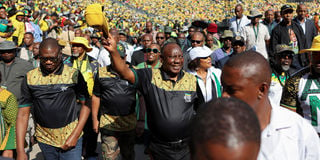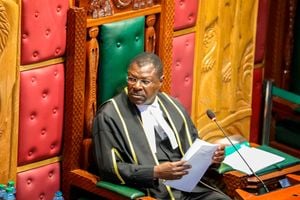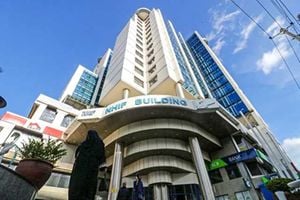Premium
How ANC dropped the ball: Mandela party going through a 'Kanu moment'-

President of the African National Congress Cyril Ramaphosa greets supporters on his arrival at the political party’s final rally ahead of the upcoming election at FNB stadium in Johannesburg, South Africa, May 25, 2024.
What you need to know:
- The expulsion of Malema from ANC in 2012 brings back memories of the reign of terror during the Kanu rule.
- Kanu was dominated by demagogues who were impatient with political reforms.
South Africa’s African National Congress (ANC) is experiencing a ‘Kanu moment’ – a reference to a period in Kenya’s political and democratic history that was marked with political antecedents that pushed the independence party out of favour with the electorate on the back of undelivered economic and social equity promises.
In the May 29 elections, ANC received only 40.18 per cent votes, well short of a majority. For the first time since the end of apartheid in 1994, the once-dominant party will need to make a deal with other parties to form a coalition government.
In Kenya, Kanu is now a pariah and there are fears in southern Africa that independence parties in the region are hurtling towards self-destruction. Today, Kanu’s voice in Parliament is no more than a whimper and it could get worse, according former Secretary-General Nick Salat. The comparison between ANC and Kanu was recently expressed by a Zimbabwean trade minister, who on a visit to Johannesburg, warned President Cyril Ramaphosa that ANC risked being relegated to irrelevance “like Kanu in Kenya” if it continued being intolerant and impervious to the economic, social and rights concerns of the hoi polloi.
When The Weekly Review caught up with Salat to shed light on such unedifying comparisons. He summed it up as “an abuse of trust by Kanu” that is being replicated all over Africa. According to Salat, Kanu has become a “case study in Africa for betraying the wretched of the earth”.
New formations
“Kanu had every chance to compete equally with the new formations because it was well structured in terms of its infrastructure as a party was comparable to none. In terms of its infrastructure… it had last mile delivery in terms of its infrastructure. If you went to any corner of this country, you won’t fail to get members who identify with Kanu.
The only setback is Kanu never changed with the times – if you are not changing with the times by allowing people to lead, then don’t blame rival political parties for your failures,” said Salat.
Thirty years since it came to power, ANC faces political, economic and social challenges like the ones Kanu grappled with at the same age after independence. It was then not uncommon in Kenya to hear Kanu being described after 30 years “as going through a middle-life crisis”. This was in reference to its unproductivity and unresponsiveness to changing times to match the political trends in the world.
ANC faces the same crisis in South Africa. Hospitals and other social amenities are in disarray. When Kanu lost favour with electorate in 1997, it was forced into a coalition with Raila Odinga’s National Development Party to push its agenda in the national assembly. If opinion polls are to be trusted, the ANC is primed to enter a political alliance with white minority-led Democratic Alliance (DA), to the chagrin of Black freedom fighters.
Data gleaned from South African labour movement websites show that this year the “Rainbow Nation” “has deep socio-economic problems, none more jarring than the widespread and severe poverty that still overwhelmingly affects the Black majority. The official unemployment rate is 32 per cent, the highest in the world, while it’s more than 60 per cent for young people aged 15-24.”
Asked for comment on the disdain for Kanu and other independence parties in Africa, former Kanu Nominated MP, Prof Ruth Oniang’o, ascribed the phenomenon to greed and unremitting thirst for power in Kenya that is being replicated elsewhere. Prof Oniang’o, however, points out that ANC had the advantage of learning from the bad manners of Kanu in Kenya to railroad South Africa on the road to prosperity.
Short memory
“Politics stays the same… but the kind of human beings we have today are behaving differently, influenced by a changing environment (globalisation). Also people are coming out in their true colours. Short memory and short attention span (is concern for political stability and economic growth in Africa). So-called leaders have low tolerance level, easily bored, no trust. It is all about Me, Me, Me... individualistic and self-centredness. Kanu was (like) a company, which did not adjust with the times. Remember at one time we all saw it and accepted it as Mama na Baba,” recalls the don, a lecturer at Jomo Kenyatta University of Technology in Nairobi.
After the departure of Thabo Mbeki, South Africa has been rocked by high-level graft with former President Jacob Zuma and incumbent Cyril Ramaphosa accused of complicity. Zuma is accused of being a beneficiary of arms trafficking, an allegation that recently sucked in former Speaker Nosiviwe Mapisa-Nqakula. Ramaphosa is smarting from the discovery $500,000 in a coach in his living room, that has not been uncounted for.
In 1994, ANC promised equal rights to all South Africans. But 30 years on, the “rainbow nation” Mandela envisaged is a mirage. Two years ago, President Ramaphosa faced searing criticism over frequent power blackouts that seriously eroded industrial production and job creation. Since March this year, major South African cities –Johannesburg, Pretoria and Cape Town – have been experiencing acute water shortages, with reports of explosion of cholera and other waterborne diseases adding to the socioeconomic woes of a country that was once the envy of the continent.
“Political parties outside Kenya look at Kanu as a party that never really wanted to sustain its vibrancy. To sustain vibrancy meant to bring on-board people who have come of age in that particular period. By coming of age I mean inclusivity. You don’t retain the old tag then purport to demonise Kanu when you are repeating the same mistakes. The very same people who want to demonise Kanu today, were the same people who were in Kanu, but Kanu was in an awkward position then,” said Mr Salat.
After the repeal of political pluralism in 1965 when discontent began to build up against founding President Jomo Kenyatta, Kanu unleashed a wave to terror on its critics that is remembered for the assassination of Pio Gama Pinto, a political gadfly with the capacity to unsettle the governing clique as does Julius Malema and the late Chris Hani in South Africa.
The expulsion of Malema from ANC in 2012 brings back memories of the reign of terror during the one-party era when the phrase “disgruntled elements” was akin to a death sentence. The assassinations of Tom Mboya, JM Kariuki and John Robert Ouko were preceded by unqualified allegations of “disgruntled elements,” according to Salat. The phrases sent many others into political oblivion – although some (lucky to be detained) managed to resurrect their political careers after Kenyatta and Moi exited power.
Unfulfilled promises
The paranoia, adds Salat, was triggered by fears of unfulfilled promises made in Sessional Paper No.10, regarded as a consequential document that carried the hopes of Kenya as a newly independent nation. “That was a time in history when strongmen were accepted as leaders...and poverty was not felt as unique. Somehow Moi ruled with empathy, but Ruto is ruthless. Then there has been all this American influence: marketing a product called democracy, which they cannot control themselves,” says Prof Oniang’o of the ideological crises Kenya and South Africa plunged following the betrayal of impendence promises.
Sessional Paper No.10 envisaged economic take-off with industrialisation, education and social protection as the drivers.
“It should be recognised that if the nation’s limited domestic capital is used to buy existing land, livestock, buildings and equipment, the nation has no more productive assets than before – only their ownership has changed. What may be lost are the new resources that could have been purchased instead – the new schools, hospitals, roads, water supplies, irrigation schemes, rolling stock, land surveys, housing, lodges, airports and harbour development – and the employment opportunities and added output that these new developments would create,” according to the 1965 Sessional Paper No.10, billed as Kenya’s blueprint for economic take-off.
Land, inter-ethnic coexistence and business ownership remain prickly issues that independence parties have to grapple with. The same applies to ANC.
“Kanu (and now ANC) is an ideal case study for political parties across the continent of how not to do thing things… Independence parties should never die. Those who are in Kanu now should decide when or to continue doing the same old things and getting the old results. Or they should smell the coffee and realise that politics of yesteryears and today is totally two different things. Let other countries learn that the more you retain the old way of doing things, other entities will come in and pass you by. At the end of the day the end-game of a political party is power and if you ignore citizens, you lose it,” said Mr Salat.
Political demagoguery, explain Prof Oniang’o and Salat, is the source of disenchantment with ANC and Kanu, leading to splits. Similar situations obtain in Zimbabwe, where independence parties Zapu-PF and Zanu-PF are sliding into insignificance. They are accused of the same mistakes Kanu made in Kenya, and which are currently being replayed in South Africa as the country holds its seventh general election.
Kenya and South Africa waged the longest and bloodiest wars of liberation in Africa, with ANC ascending to power in 1994 when Kanu’s star in Kenya was dimming. ANC’s missteps have elicited comparisons with Kanu’s trajectory before its 40-year reign ended sensationally ended 2002, an election outcome that shook Africa and necessitated a resetting in some countries that were accustomed to one-party rule. That Kanu has become something of a case study in African political democracy is not surprising, said Salat.
“Kanu was dominated by demagogues who were impatient with political reforms in keeping with the times. ANC has slipped into similar demagoguery at a time groups that split from the independence party are building momentum,” he observes.




